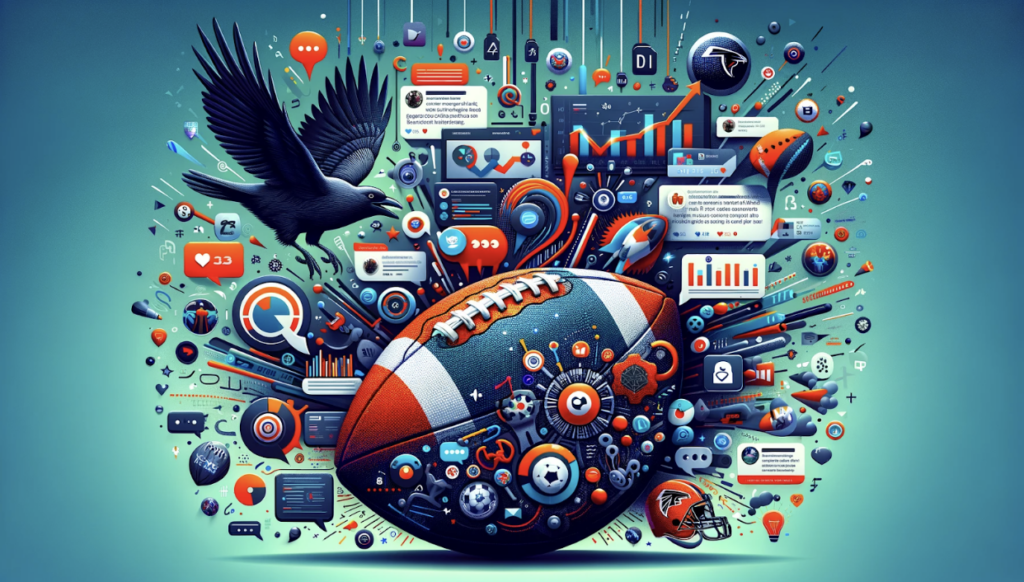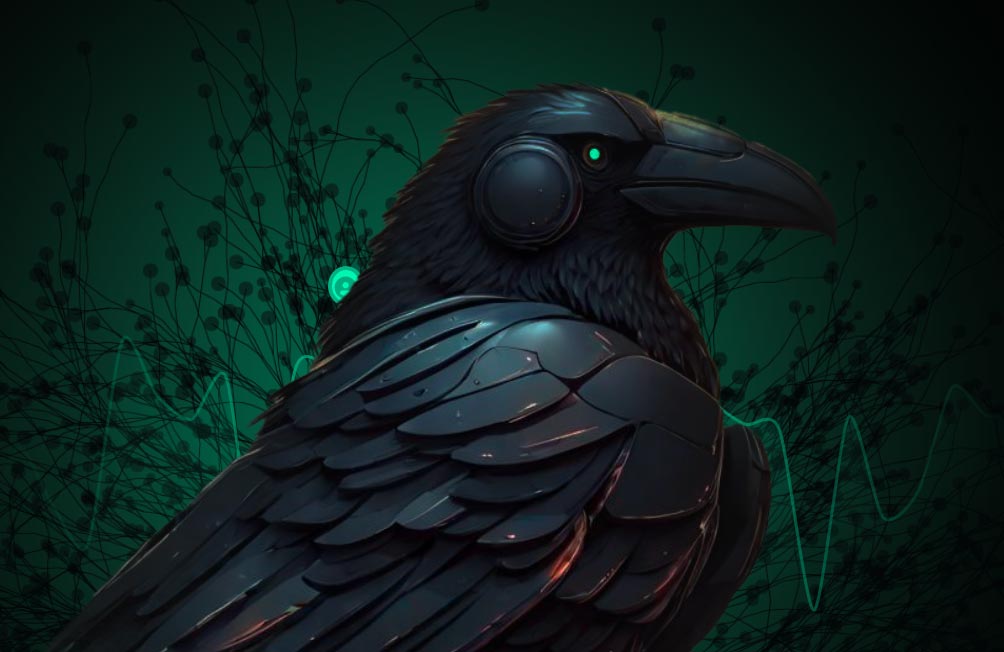A Super Bowl of Misinformation and Disinformation: How Narrative Attacks Shaped the NFL’s Controversial Season
By Logan Pollick, Beatrice Titus, and Blackbird.AI’s RAV3N Narrative Intelligence and Research Team
Shifting narratives reveal profound investment and passion and erode trust and cynicism within a devoted, vocal football fanbase.

The Super Bowl is undoubtedly the biggest annual sporting event in the United States. As Super Bowl LVII approaches, social media has been abuzz with diverse conversations and narratives surrounding the NFL’s premier event. Blackbird.AI’s RAV3N Narrative Intelligence and Research Team recently analyzed the top social media narratives from the most recent NFL season. This blog post takes a deep dive into the key narratives that have emerged on social media, shedding light on fans’ sentiments and perspectives.
LEARN MORE: What Is A Narrative Attack?
The Super Bowl captures the attention of over 100 million viewers every year. The conversations and narratives in the big game build-up provide a unique window into NFL fans’ passions, interests, and concerns. The social web has recently been flooded with diverse perspectives, claims, and allegations about the NFL, the Super Bowl, teams, players, coaches, and league officials. By analyzing trending narratives, we can decode the current pulse of NFL fandom and identify critical issues around integrity, entertainment, business, and culture.
This blog post specifically delves into four major narratives defining NFL-related social media discussions over the past month. We assess the origins, propagation, and implications of narratives around game-rigging, the Super Bowl going pay-per-view, allegations of racism against a coach, and referee manipulation. Preliminary observations reveal nuances in fan sentiment leading up to Super Bowl LVII. As the season progresses, we expect new narratives to emerge surrounding controversial decisions, celebrity involvement, coaching changes, and more. Ultimately, this analysis provides crucial intelligence into the ever-evolving perspectives of the NFL’s diverse fanbase.
False Narrative #1: The NFL is Rigged
One of the most vocal narratives on social media, discussed by over 30 thousand users, alleges that the NFL covertly influences or outright fixes the outcomes of games. This season, accusations of biased officiating and league conspiracies to benefit popular teams have earned 371,873 engagements from 48,258 posts. The focal point was the Dallas Cowboys’ controversial victory over the Detroit Lions on December 30, 2023.
In the final seconds, referees flagged Detroit’s offensive lineman Taylor Decker for holding, nullifying a touchdown that would have given the Lions a stunning comeback win. This instantly ignited allegations of the game being rigged to favor the Cowboys. The social web exploded with angry Lions fans demanding investigations and even lawsuits against the NFL for defrauding ticket holders. Several viral videos seemingly proving the referees’ bias in favor of Dallas fueled the rigging narrative.
In multiple interviews, former NFL player Larry Johnson asserted that the NFL coordinates outcomes, likening it to WWE wrestling. He claimed insiders had confessed to him about scripts being created before games to maximize profits. Such direct accusations from an NFL veteran gave further credence to suspicions of match-fixing.
Beyond specific games, a broader sentiment of distrust toward the league emerged. Many users suggested consistent favoritism by the NFL towards large-market teams like Dallas and, more recently, the Kansas City Chiefs, alleging the manipulation of outcomes, refereeing, and even draft orders to support money-spinning franchises. As playoffs unraveled, many speculated that the NFL wanted Kansas City in the Super Bowl, making the event a “Taylor Swift Super Bowl.” Users alleged that the attention from Swifties and fans would bring in a larger profit for the NFL, therefore providing a motive for the organization to ensure the Chief’s attendance. Overall, the game-rigging narrative reveals a strain of skepticism among fans about the integrity of NFL competition.

False Narrative #2: New England Patriots New Head Coach Jerod Mayo is Racist
In late December, the New England Patriots created headlines by appointing linebackers coach Jerod Mayo as their new head coach. Mayo became the first African-American head coach in the Patriots’ history. However, this move soon became embroiled in controversy, amassing over 50 thousand engagements in one day over racist comments Mayo allegedly made years ago.
Several old blog posts and articles resurfaced on social media highlighting Mayo’s past objections to NFL policies promoting racial equality, like the Rooney Rule. Critical posts also claimed Mayo had made racist statements against Latino players when he was a player himself.
Some users accused the Patriots of overlooking Mayo’s discriminatory views just to gain public relations points for hiring a black coach. Others contended this was evidence of the team’s history of racism. However, an alternate sentiment also arose, applauding the Patriots for giving Mayo a chance despite past mistakes and emphasizing the need for forgiveness and growth.
This polarizing narrative underscores the complexities of discussing race within the NFL. It also reveals the intense scrutiny faced by coaches on issues of discrimination. For the Patriots and Mayo, these accusations will pose an early test of his leadership and their commitment to inclusion.
False Narrative #3: NFL Officials Manipulate Games for Sports Betting
Another major narrative focuses on suspicions around the integrity of NFL referees and officials. Specifically, many fans have accused referees of deliberately influencing game outcomes to benefit sports betting outcomes.
Sports betting’s ongoing legalization and popularity explosion have made game-deciding penalty calls lucrative. Several clips went viral showing dubious fouls that changed betting spreads late in games this season. Bot-like activity and anomalous behavior were present in 18.5% of posts and 10% of posts, demonstrating the inauthentic amplification and unusual degree of automation in the narrative. Such moments fueled accusations of individual officials manipulating calls to serve gambling interests.
More broadly, the narrative suggests a mood of growing skepticism among fans toward the intentions of referees. Tweets claim an inherent conflict of interest emerges with the prevalence of high-stakes sports betting. Over 35% of users expressed negative sentiment demanding greater accountability and transparency around officiating crews and league oversight.
These allegations further erode trust in the NFL’s integrity and raise concerns about the league allowing betting partnerships. Protecting competitive purity from gambling-related manipulation has become a focal issue.
False Narrative #4: The Super Bowl Will Move to Pay-Per-View
Another prominent narrative stems from speculation that the NFL plans to shift the Super Bowl to a pay-per-view broadcasting model. This narrative originated from the successful exclusive live stream of an NFL playoff game on Peacock this January, generating an estimated 23 million viewers.

The subscription streaming service drew sizable viewership for the first-ever playoff game not to air on national television. Based on this, analysts theorized that the NFL could test appetite for premium paid access to big games. Given the Super Bowl’s market dominance, putting it behind a paywall would likely generate massive revenues.
However, these suggestions were met with strong opposition and criticism on social media as users shared negative rhetoric in over 20% of posts. The dominant sentiment was that pay-per-view would drastically limit viewership and go against the communal spirit of Super Bowl watch parties. Many users lamented the NFL disregarding audiences to chase higher profits. Some vowed to boycott the Super Bowl entirely if the NFL adopted this model.
This narrative highlights how the league’s commercial decisions can directly impact audience experiences. It also demonstrates fans’ wariness of programming changes that would disrupt the accessibility of watching the Super Bowl.
READ MORE: Taylor Swift and Travis Kelce vs. The Internet: A Relationship Shaped by Disinformation
Blackbird.AI analysts recognized anomalous and bot-like activity was high throughout the entire dataset, 28.2% and 14.3%, respectively. In addition, we utilized the Blackbird.AI activity graph, which guided us to the most important conversation spikes, seen below, on September 24 and 25, 2023. Unpacking narratives often had our analysts looking towards prominent users and terminology – like negative sentiment – sometimes directed towards Swift. As we unpacked narratives, we often identified a counter-narrative against the prevailing conversation where Swift fans expressed positive sentiment.
False Narrative #5: Taylor Swift Manipulated the Super Bowl Teams
Taylor Swift has been a popular topic of discussion for football fans since the announcement of her relationship with Kansas City Chiefs tight end Travis Kelce, attracting both positive and negative attention.
In the beginning weeks of the season, Swift fans made lighthearted jokes referencing Swift’s discography and sharing general support for the relationship. Swift’s presence and speculated attendance to future games had tremendous economic influences as ticket prices and jersey sales soared. As Swift’s presence continued, football fans and Swifties connected, with some men thanking Swift for influencing the women in their lives to take an interest in their beloved game.
Despite the overwhelming support, numerous harmful narratives emerged, demonstrating broader societal issues and divides. Users claimed the relationship was a PR stunt designed to push Democratic ideologies due to Swift notoriously encouraging her fans to register to vote and Kelce’s involvement with perceived controversial brands. Additionally, users frequently asserted that Swift is ruining football while creating edits for the Chief’s opposing team to ‘save the fate’ of the league. Some users escalated and circulated sexually explicit deep fakes of the singer, sparking controversial discourse online.
This analysis of recent NFL-related narratives exposes mixed perspectives among football fans approaching Super Bowl LVII. While the Super Bowl remains a widely anticipated cultural event, skeptical undertones surround the NFL’s integrity and motives. Flashpoints around perceived bias, racism, commercialism, and corruption reflect a vocal minority’s distrust. However, the positive sentiment still dominates casual discussions.
As the season culminates, we can expect new narratives to emerge, merge, and dissolve around refereeing controversies, coaching staff changes, viral celebrity incidents, and on-field surprises. Such narratives have already surfaced surrounding the Taylor Swift and Travis Kelce relationship, where the RAV3N Narrative Intelligence and Research Team identified both polarizing and community-building conversations, further demonstrating the range of fan sentiment. The Super Bowl’s unique status as a social media phenomenon will likely produce fresh narratives around the halftime show, ads, and online humor content.
Mapping NFL narratives exposes the profound cultural footprint, political gravity, and community passion surrounding professional football. The ever-shifting conversations reflect fans’ deep investment in the sport as entertainment, business, and a representation of society’s structures. Tracking social media allows us to take the pulse of this diverse, devoted fanbase that defines the enduring allure of football.
To learn more about how Blackbird.AI can help you in these situations, contact us here.



